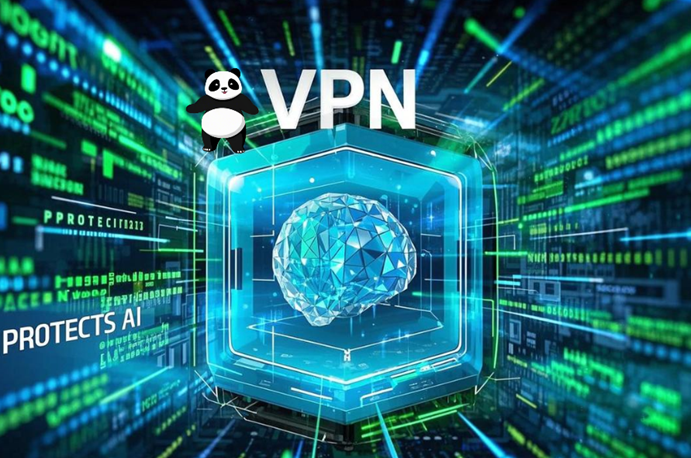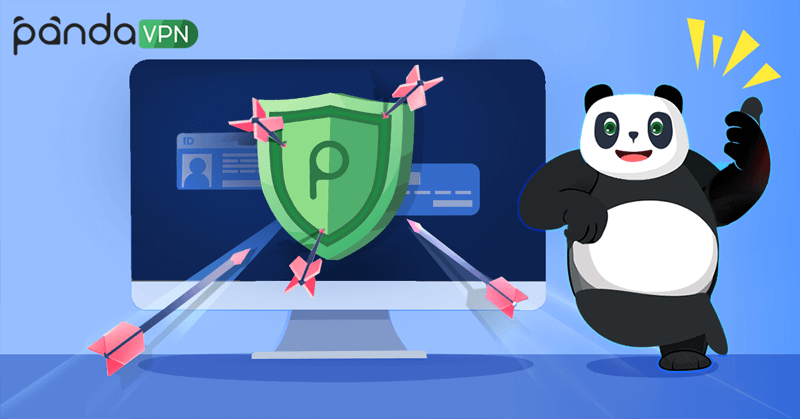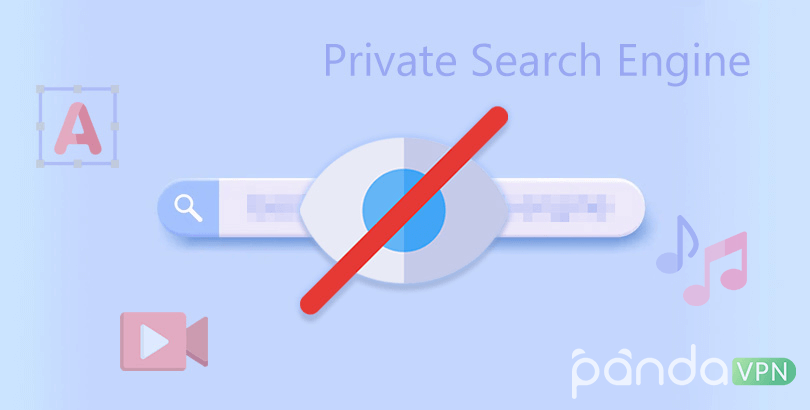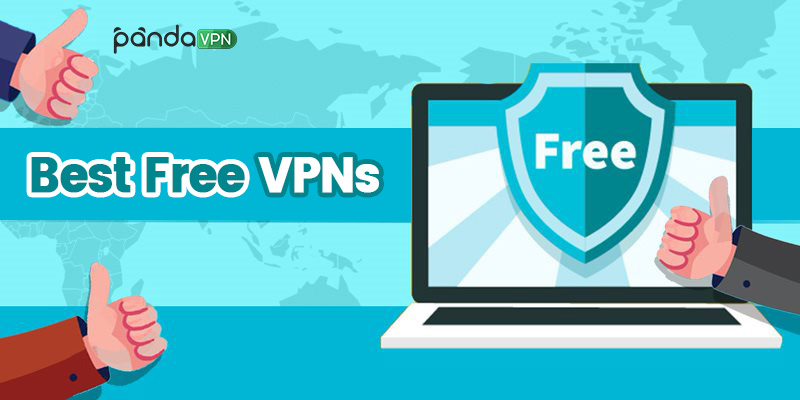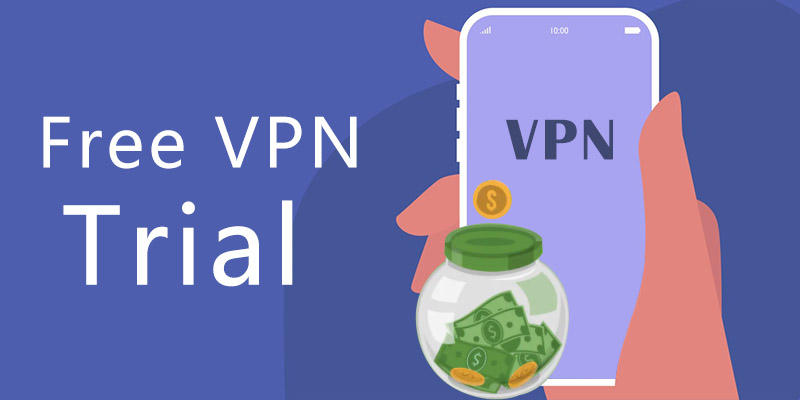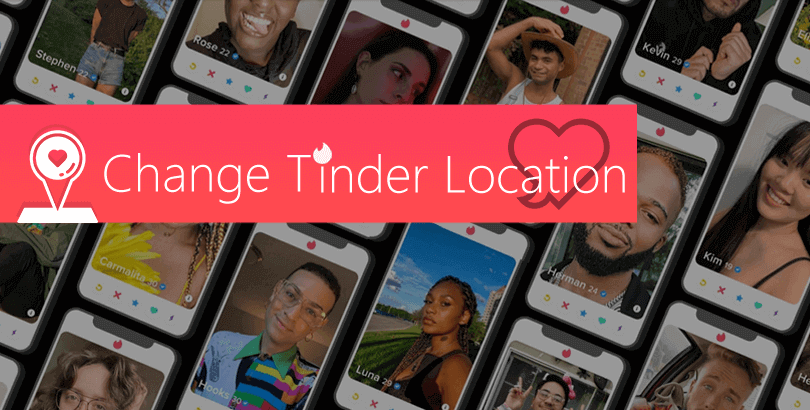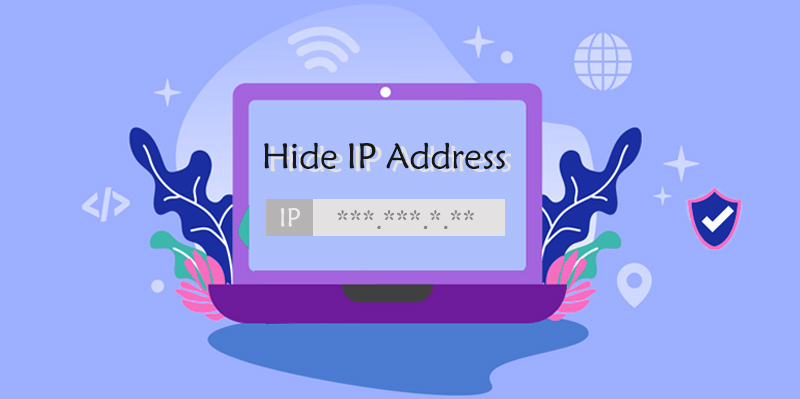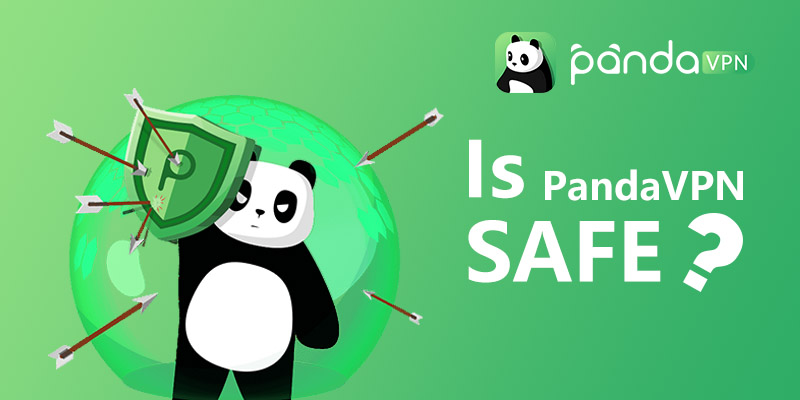Internet Censorship: A Game Between Online Restriction and Freedom
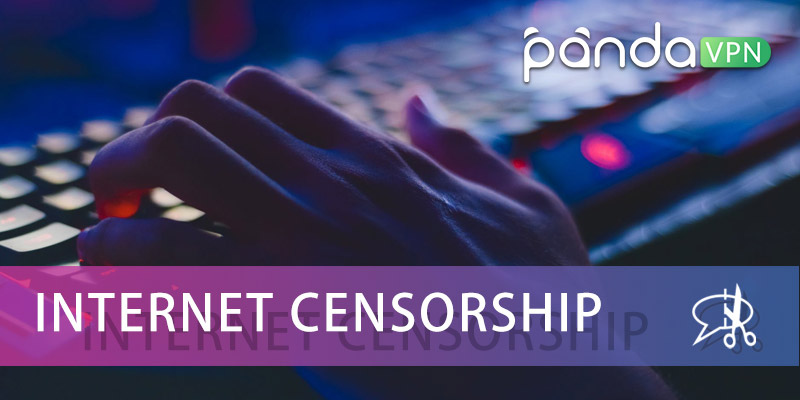
Still ignorant of internet censorship nowadays? This article will help you get a comprehensive understanding of it by explaining how this control goes, showcasing its pros and cons, and ranking the top censored countries.
Global internet freedom is continuously declining, especially after the COVID-19 outbreak in late 2019. Many governments not only make the most possible efforts to get through this unexpected public health crisis, but also deepen the national internet surveillance and censorship to limit free expression and information access on the web.
Does that remind you of the memory of a saying – “cyberspace is likely to be the world’s next battlefield“? No exaggeration to say, it already is now. China builds the most powerful Great Firewall and strengthens it every now and then to disallow the general public to access piles of foreign social media platforms, news sites, (free movie) streaming sites or services, etc. Russia and Iran plan to isolate the worldwide internet completely by setting up their domestic internet, and even some countries with higher web freedom like the United States and India start to ban Chinese apps for security concerns. There are so many similar examples that if all are listed, it should be a paper with thousands of words.
Then what is internet censorship? How does it work? Is it possible for you to get it around? Whether it’s necessary to conduct such online censorship? You will have your own answer after completing this post thoroughly.

Definition
Internet censorship, as the name implies, refers to the Internet usage control or advocating conducted by a certain party like the government, ISP, corporation, or personal internet administrator. In most cases, online censorship simply means the one that’s imposed and advocated by government agencies by limiting people’s freedom to access online resources, freedom of online (speech) publication, and the freedom to use related online services, for the purpose of building a well-balanced public opinion and social environment. Besides, institutions, organizations, or individuals can also do self-censorship.
Now let’s dive into the six truths about Internet censorship you should know today.
1. The Birth of Online Censorship
The Internet, as one of the greatest inventions in the last century, has changed the way humanity lives. From the advent of basic internet technologies, protocols, applications, and services, to Web 1.0, 2.0, then the most recent mobile semantic web and Subsea Internet of Things/SIoT, it just takes about six decades for the Internet to alter people’s everyday activities completely, bringing the world into a new digital level, with everything interconnected. How fast it is! According to the recent data in July 2021, the number of internet users worldwide has reached 4.8 million, accounting for 61% of the world’s total population. Social media and e-commerce hold the top places where average netizens turn the internet light on.
The emergence of the Internet has subverted the communication mode of media.
Traditional media, such as newspapers, magazines, broadcasts television, and radio, all belong to “vertical transmission” and enjoy a one-way transmission. Since all of the content is strictly planned and created by professional organizations and industry experts, they are surely born with authoritativeness and conform to the laws and mainstream social values.
The new media, reconstructed by the appearance of the Internet, such as website, blog, email, social media, streaming, and many more, belong to “horizontal transmission”. Everything here is user-oriented, everyone could be the content producer, and the content production modes become more diversified, not limited to paper print and official channel release. Due to the lack of strict standards, the “network content pool” turns into a mixed bag that contains piles of superficial, misleading, vulgar, and even violating information online. This is where internet censorship comes in.
To regulate the spread of fake, harmful, and illegal information on the web and maintain the stability and security of both virtual and physical societies, more and more countries and regions have already upgraded their laws and regulations on network supervision and censorship. In the meantime, quite a lot of companies and individuals operate self-censorship, contributing their own shares to cooperate with the national monitoring.
In one word, internet censorship is a crucial measure regarding politics, religions, social norms, ethics, and state security.
2. Target Content of Internet Censorship
So, among the massive network resources, what exactly will be the target of this online censorship? The following list outlines a dozen of typical examples regarding politics, social norms, security, and economic interests roughly, some of which may overlap. Since the actual censored content varies from nation to nation, you don’t have to entangle yourself into doubt on any specific one.
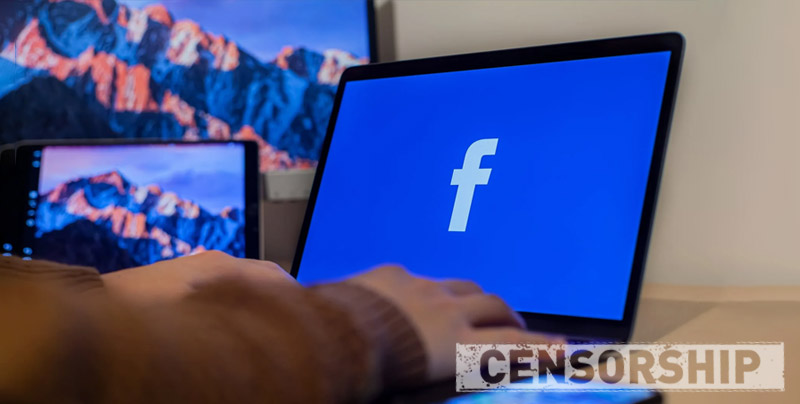
– Content, websites, and games on politics, opposing the dignity of the sovereign, country, political party etc.
– Content, websites, and games on religion and ethics
– Content, websites, and games with anti-social ideology and hate speech like terrorism, Nazism, activism, sexism and racism
– Content, websites, and games on pornography (including child pornography), pedophile, erotic, prostitution, anti-gay, fetish, etc.
– Content, websites, and games that encourage drug abuse
– Firearms, drugs, and other illegal trafficking websites
– Gambling websites and games
– Peer-to-peer sharing or download websites that illegally spread and sell copyrighted works
– Websites leaking secrets
– Websites providing VPN and proxy services to break through internet censorship
– All other sites and services that violate local laws and social norms, including social media, search engines, website hosting services, email, information sharing, multimedia sharing, and similar
In short, social media platforms (e.g Facebook and Twitter), political websites, streaming services (e.g YouTube and Netflix), video games, porn, and torrent sites (see Top 15 Torrent Sites 2022) are top censored content, and the real situation does vary from location. Some countries directly ban the unwanted resources directly while some establish related rating systems to better manage the access or purchase of certain groups of people like the adolescent under 18. The ESRB(Entertainment Software Rating Board) from the US and BBFC(British Board of Film Censors) from the UK are typical game and movie rating system examples.
Speaking of video game, not only game pieces but also game consoles can be banned for further usage. Mainland China once banned all home gaming consoles and now closes the door for all overseas games depicting violence, gore, blood, sex, gambling, vulgar and imperial history. Germany bans that games violating the Strafgesetzbuch section. The United Arab Emirates’s National Media Council stops the physical retail of a group of law-against games. And Saudi Arabia bans both physical and digital selling of offensive or improper games…
If you want to know the specific situation of each country, you can refer to the “Internet Censorship Ranking by Countries” section or directly inquire about relevant national laws.
3. Three Internet Censorship Methods
In general, internet censorship is operated with three approaches: technical censorship, non-technical censorship, and self-censorship of web service providers.
Technical Censorship
Technical censorship is usually implemented by filtering keywords, domain names, and IP addresses. After the target words, addresses are collected and added to the blacklist, it will co-work with the Internet service providers (ISP), certificate authority (CA) issuing agencies, content delivery network (CDN), application service providers, and many more different parts to achieve the filtering together. Specifically, there are also many technologies involved in the filtering process, for instance, IP address masking, DNS filtering, and redirection, URL link address filtering, TCP packet filtering, target router disconnection, search results removal, etc. In addition, DoS and such network attack methods are also available to achieve the same blocking effect.
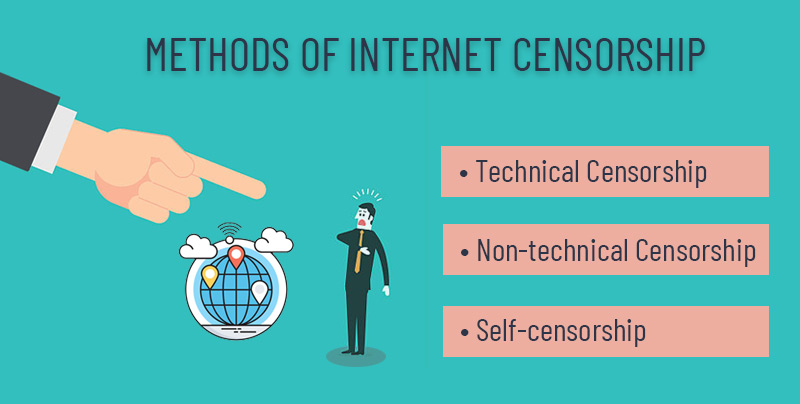
With the increasing demand for content filtering, many Internet content control software came into being. SmartFilter, Netsweeper and Websense, just to name a few. Governments, ISPs, corporate employers, school libraries, coffee shops, and even parents would like to purchase and use this kind of commercial content filtering software for better web usage management and control, including but not limited to streaming and e-mail services. With the cooperation between such commercial software developers and governments, the software developers are commonly regarded as the “public enemies” to violate human rights and freedom of information.
There are so many web resources, hence more often, regardless of the type of filtering software or technical means, it cannot be 100% guaranteed that the actual ruling result will be the same as expected. On the contrary, some targets may be missed out or some innocent content or sites are accidentally included.
Non-technical Censorship
Non-technical Internet censorship is more a traditional method, not involving any tech. The root cause of this kind of censorship may lie in the national law, the online platform policy, the appeals or prosecutions of copyright owners (e.g publisher and author), the requirement of ISPs and the event victims, the physical problem of equipment and network, the termination of network services, etc. Any irresistible reason that leads to the same censoring outcome is truly non-tech censorship.
Self-censorship of Internet Service Providers
The network service providers here include manufacturers of all online services and tools, such as Google, Microsoft, Facebook (see Facebook censorship details), Twitter, YouTube (see how to fight YouTube censorship), Wikipedia, etc. Generally, each service provider will customize the user terms statement in accordance with laws, regulations, and their own conditions to ensure that all users have the freedom of online speech and expression without breaking the “red warning line” that should be there. The implementation of specific censorship may leverage both technical and non-technical reviews.
4. Pros and Cons of Internet Censorship
As a product of the digital era, Internet censorship must have its own unique advantages and disadvantages, so we have made some simple pros and cons conclusions.
Pros:
– Help build a harmonious and green information environment, protect the mental health of children and adolescents, and promote the development of content classification.
– Maintain the security of data and information in this big data age, especially information related to national security.
– Protect the “limitations” of netizens’ common perceptions and prevent them from being flooded with violent, non-peaceful, and unhealthy information.
– Reduce the infringement of intellectual property rights, protect copyrighted content, and the legal rights of copyright owners.
– Close the door for people to enter into illegal websites such as the dark web, and then engage themselves in illegal activities, such as human trafficking, child pornography, sex trafficking, drug and firearms transactions, etc.
– Fight against fake news, false advertisements, wrong information releases, etc., and ensure the correctness of disseminated content.
– Protect public identity against theft.
– Reduce cyber crimes, especially hacking incidents that have an impact on national security.
– Reduce information that may cause conflicts between countries, races, etc., and ease diplomatic relations, especially in politically sensitive periods.
……
Cons:
– The lack of truth will lead to ignorance. That said, excessive restriction on web information will make the general public’s sight somewhat limited and the overall cognition level poor, thus unable to learn and accept new things more comprehensively and objectively for a healthy worldview.
– That preventing the free flow of information is contrary to the spirit of globalization.
– Prevent individuals from free speech. In the space of the Internet, which should be a place of freedom, people cannot express their true thoughts, opinions, and opinions at all in countries subject to strict supervision and censorship.
– Countries and regions with severe Internet censorship will form a stereotyped and closed impression such as North Korea and China.
– High cost of censorship implementation. From tech to labor support, the cost behind large-scale network censorship is unimaginably high, up to xx billion every one year.
– Negative economic impact. When the website or online information of a company is blocked due to being not compliant with local regulations, it will be difficult for all-sided marketing. What’s worse, censorship stifles many entrepreneurial opportunities.
……
5. Is It Possible to Circumvent Internet censorship? If Yes, How?
From the above information, we can draw that ordinary Internet censorship is implemented by filtering IP addresses, keywords, and domains. Then, facing various censorship mechanisms at the public-, enterprise- and national level, can we break and regain the freedom of the net?
The answer is yes. With a VPN (also known as virtual private network) or a proxy server installed on your smart device, you are allowed to bypass network censorship and content filtering. VPN is more favored and recommended by users thanks to the higher security level (all data is encrypted and transmitted through locked VPN tunnel), better stability, faster speed, and averagely more server configurations. If you happen to look for a long-term solution to stay away from Internet censorship programs, PandaVPN is a good bet to go.
![]()
PandaVPN is easy-to-use, fast, and stable. With 3000+ high-speed servers located in 80 countries and 170+ locations worldwide, you can hide your IP address and get a new one from either of those supported places just like you are a local. Places with relatively less strict or no internet censorship like Iceland, Canada, Germany, and the United States are top options. Now remove the internet limits for watching streaming movies, listening to songs, playing online games, accelerating speed, doing (P2P torrent) file downloads, unlocking social tools and network services around the world without hassle.
Key features: Multi-protocol support | The highest level of ECC encryption | Zero log policy | Split Tunneling | AdBlocker | Streaming/Game/BitTorrent friendly | 3 Devices Simultaneous Online
Platforms supported: Windows, macOS, Linux, iOS, Android (TV)
Related: What’s VPN used for, The difference between VPN and proxy, How to choose a VPN
6. Internet Censorship Ranking by Countries
At first, we have summarized the following table from the recent decade’s annual Internet freedom reports by Freedom House, a well-known non-governmental organization devoted to global democracy and freedom researches based in Washington, DC.
* Considering Freedom House only picks 70 typical target countries to track and investigate, ignoring some of the same similar countries such as North Korea, Turkmenistan, etc., we have added those representative names to the summary for your reference.
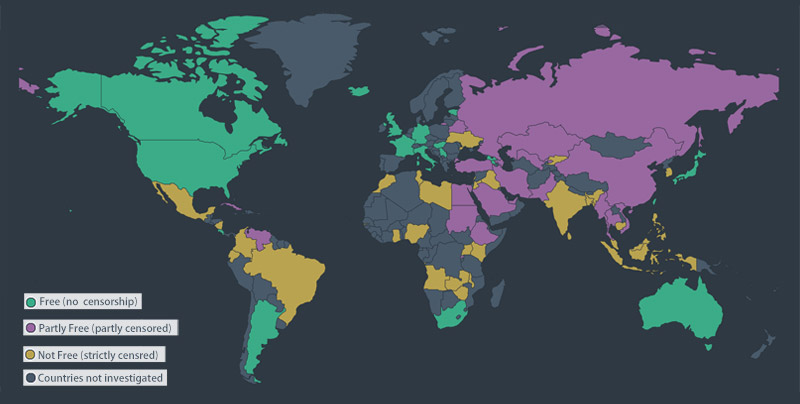
*Note: All of the information is updated according to the fresh 2021 Freedom’s internet freedom report.
| Not-Free Countries with the Most Internet Censorship | ||||
| Country | Total Score and StatusSort ascending | Obstacles to Access | Limits on Content | Violations of User Rights |
| China | 10 Not Free | 8 | 2 | 0 |
| Iran | 16 Not Free | 8 | 5 | 3 |
| Myanmar | 17 Not Free | 4 | 7 | 6 |
| Cuba | 21 Not Free | 5 | 9 | 7 |
| Vietnam | 22 Not Free | 12 | 6 | 4 |
| Saudi Arabia | 24 Not Free | 12 | 8 | 4 |
| Pakistan | 25 Not Free | 5 | 13 | 7 |
| Egypt | 26 Not Free | 12 | 10 | 4 |
| Ethiopia | 27 Not Free | 4 | 12 | 11 |
| United Arab Emirates | 27 Not Free | 12 | 9 | 6 |
| Uzbekistan | 28 Not Free | 9 | 12 | 7 |
| Venezuela | 28 Not Free | 6 | 12 | 10 |
| Bahrain | 30 Not Free | 16 | 8 | 6 |
| Russia | 30 Not Free | 12 | 10 | 8 |
| Belarus | 31 Not Free | 10 | 14 | 7 |
| Kazakhstan | 33 Not Free | 11 | 11 | 11 |
| Sudan | 33 Not Free | 6 | 15 | 12 |
| Turkey | 34 Not Free | 15 | 10 | 9 |
| Azerbaijan | 35 Not Free | 10 | 14 | 11 |
| Thailand | 36 Not Free | 16 | 13 | 7 |
| Rwanda | 38 Not Free | 13 | 11 | 14 |
☞ Top 10 Internet-censored Countries: China, Iran, Myanmar, Cuba, Vietnam, Saudi Arabia, Pakistan, Egypt, Ethiopia, United Arab Emirates
☞ Extra country examples with heavy net censorship: North Korea, Qatar, Thailand, Turkmenistan, Eritrea, Equatorial Guinea
| Free Countries with the Most Internet Freedom | ||||
| Country | Total Score and StatusSort ascending | Obstacles to Access | Limits on Content | Violations of User Rights |
| Iceland | 96 Free | 25 | 34 | 37 |
| Estonia | 94 Free | 25 | 32 | 37 |
| Canada | 87 Free | 23 | 32 | 32 |
| Costa Rica | 87 Free | 20 | 33 | 34 |
| Taiwan | 80 Free | 24 | 31 | 25 |
| Germany | 79 Free | 22 | 29 | 28 |
| France | 78 Free | 23 | 30 | 25 |
| United Kingdom | 78 Free | 23 | 30 | 25 |
| Georgia | 77 Free | 19 | 31 | 27 |
| Italy | 76 Free | 21 | 30 | 25 |
| Japan | 76 Free | 21 | 29 | 26 |
| United States | 75 Free | 21 | 29 | 25 |
| Australia | 75 Free | 23 | 27 | 25 |
| South Africa | 73 Free | 17 | 29 | 27 |
| Serbia | 71 Free | 21 | 25 | 25 |
☞ Top 10 Countries with Free Internet Censorship: Iceland, Estonia, Canada, Costa Rica, Taiwan, Germany, France, United Kingdom, Georgia, Italy
| Partly-Free Countries with Average Internet Censorship | ||||
| Country | Total Score and StatusSort ascending | Obstacles to Access | Limits on Content | Violations of User Rights |
| South Korea | 67 Partly Free | 22 | 24 | 21 |
| Kenya | 66 Partly Free | 16 | 27 | 23 |
| Colombia | 65 Partly Free | 19 | 25 | 21 |
| Philippines | 65 Partly Free | 17 | 26 | 22 |
| Brazil | 64 Partly Free | 20 | 24 | 20 |
| Ghana | 64 Partly Free | 14 | 27 | 23 |
| Tunisia | 63 Partly Free | 16 | 28 | 19 |
| Ukraine | 62 Partly Free | 20 | 21 | 21 |
| Angola | 62 Partly Free | 12 | 30 | 20 |
| Ecuador | 62 Partly Free | 17 | 25 | 20 |
| Mexico | 60 Partly Free | 18 | 25 | 17 |
| Zambia | 59 Partly Free | 15 | 24 | 20 |
| Malawi | 59 Partly Free | 11 | 25 | 23 |
| Nigeria | 59 Partly Free | 17 | 25 | 17 |
| Malaysia | 58 Partly Free | 18 | 21 | 19 |
| Singapore | 54 Partly Free | 19 | 17 | 18 |
| Morocco | 53 Partly Free | 15 | 22 | 16 |
| The Gambia | 53 Partly Free | 12 | 22 | 19 |
| Kyrgyzstan | 53 Partly Free | 13 | 23 | 17 |
| Sri Lanka | 51 Partly Free | 11 | 23 | 17 |
| Lebanon | 51 Partly Free | 11 | 22 | 18 |
| Uganda | 49 Partly Free | 11 | 19 | 19 |
| India | 49 Partly Free | 11 | 21 | 17 |
| Nicaragua | 48 Partly Free | 12 | 18 | 18 |
| Indonesia | 48 Partly Free | 14 | 17 | 17 |
| Libya | 48 Partly Free | 7 | 25 | 16 |
| Jordan | 47 Partly Free | 13 | 17 | 17 |
| Zimbabwe | 46 Partly Free | 8 | 22 | 16 |
| Cambodia | 43 Partly Free | 13 | 18 | 12 |
| Iraq | 41 Partly Free | 11 | 16 | 14 |
| Bangladesh | 40 Partly Free | 12 | 17 | 11 |
| Freedom on Net Survey Results from Freedom House in Last Decade | |||||
| Year | 2021 | 2020 | 2019 | 2018 | 2017 |
| Country Quantity | 70 | 65 | 65 | 65 | 65 |
| Free countries (ratio) | 18 (26%) | 15 (23%) | 15 (23%) | 15 (23%) | 16 (25%) |
| Partly free countries (ratio) | 31 (44%) | 28 (43%) | 29 (45%) | 30 (46%) | 28 (43%) |
| Not free countries (ratio) | 21 (30%) | 22 (34%) | 21 (32%) | 20 (31%) | 21 (32%) |
| Improved countries (ratio) | – | 23 (35%) | 16 (25%) | 19 (29%) | 32 (49%) |
| Declined countries (ratio) | – | 26 (40%) | 33 (50%) | 26 (40%) | 13 (20%) |
| No change countries (ratio) | – | 16 (25%) | 16 (25%) | 20 (31%) | 20 (31%) |
| Year | 2016 | 2015 | 2014 | 2013 | 2012 |
| Country Quantity | 65 | 65 | 65 | 60 | 47 |
| Free countries (ratio) | 17 (26%) | 18 (28%) | 19 (29%) | 17 (29%) | 14 (30%) |
| Partly free countries (ratio) | 28 (43%) | 28 (43%) | 31 (48%) | 29 (48%) | 20 (43%) |
| Not free countries (ratio) | 20 (31%) | 19 (29%) | 15 (23%) | 14 (23%) | 13 (28%) |
| Improved countries (ratio) | 34 (52%) | 15 (23%) | 12 (18%) | 12 (26%) | 11 (31%) |
| Declined countries (ratio) | 14 (22%) | 32 (49%) | 36 (55%) | 28 (60%) | 17 (47%) |
| No change countries (ratio) | 17 (26%) | 18 (28%) | 17 (26%) | 7 (15%) | 8 (22%) |
In accordance with the in-depth program report, EU countries, India and the United States have improved freedom over the last same period, although the (e.g.Trump administration) and India have executed something during this period like cracking down on certain apps from China. Hong Kong, Russia, Turkey, and Vietnam are preparing or have upgraded relevant laws or online censorship mechanisms. For example, in early 2021, Hong Kong introduced the “National Security Law” to block websites for the first time, and the “Hong Kong version of the Great Firewall” may follow up. Following the promulgation of “Sovereign Internet Law” in 2019, a series of new laws and regulations concerning network security have been successively designated in Russia to strengthen the Internet infrastructure and prepare for the possibility of disconnection from the outside world in the future. Iran is also finding its own direction in this no-smoke Internet battlefield: building an “intranet” to replace the internet. By virtue of the world’s most powerful national firewall, China has “got the crown of“ the most Internet-censored country once again.
Related Reading:
Top 15 Most & Least Censored Countries from More Freedom Research Organizations
Five Eyes Alliance – the World’s Most Known Survaillance Group
Final Words
It seems that more governments tend to quit their people’s rights to enjoy the liberty of the modern internet. That makes Internet censorship an increasing discussion topic worldwide. Some people believe that it’s necessary for both countries and the general public because there is too much false information, deceptive ads, anti-ethical remarks, illegal opportunities, and data theft opportunities on the web. While some, especially those living with rigorously censored regions, believe that such suppression and restrictions have greatly affected their pursuit of freedom of speech, information acquisition, and some novelties.
Is Internet censorship really beneficial and a must-have? Is it possible to end Internet censorship? Everything is a double-edged sword, so is online censorship. Imagine what it would be like if you live in a world without rules… Since awareness of rules means a lot to the development of human civilization, now that the digital age comes, proper surveillance and control indeed do more good than harm. In view of the different histories, political systems, national conditions, every country or region must have accumulated its own experience to handle everything, giving its best to realize the most possible fairness and security in all dimensions. So ending Internet censorship games is currently impossible.
☛ References:
1. Internet Censorship Wikipedia
2. Freedom on the Net 2021 Report from Freedom House
 Vic Knott
Vic Knott  2022.07.08
2022.07.08 